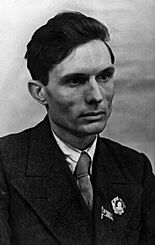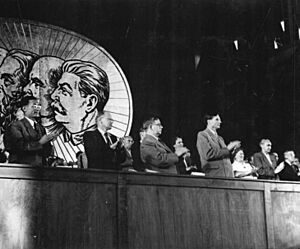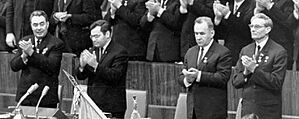Mikhail Suslov facts for kids
Quick facts for kids
Mikhail Suslov
|
|
|---|---|
|
Михаил Суслов
|
|
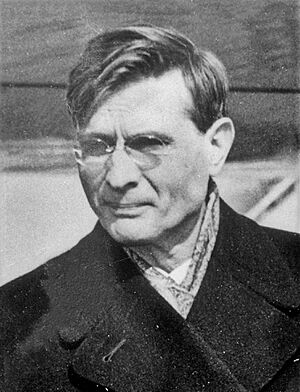
Suslov in 1964
|
|
| First Second Secretary of the Communist Party of the Soviet Union | |
| In office 6 December 1965 – 25 January 1982 |
|
| Preceded by | Nikolai Podgorny |
| Succeeded by | Konstantin Chernenko (de facto) |
| In office 14 September 1953 – 17 December 1957 |
|
| Preceded by | Nikita Khrushchev |
| Succeeded by | Alexei Kirichenko |
| Senior Secretary of Ideology of the Communist Party of the Soviet Union |
|
| In office 31 August 1948 – 25 January 1982 |
|
| Preceded by | Andrei Zhdanov |
| Succeeded by | Konstantin Chernenko (acting) |
| First Secretary of the Stavropol Regional Committee | |
| In office 1939 – November 1944 |
|
| Preceded by | Dmitry Goncharov |
| Succeeded by | Aleksandr Orlov |
| Personal details | |
| Born |
Mikhail Andreyevich Suslov
21 November 1902 Shakhovskoye, Russian Empire |
| Died | 25 January 1982 (aged 79) Moscow, Russian SFSR, Soviet Union |
| Resting place | Kremlin Wall Necropolis, Moscow |
| Nationality | Soviet |
| Political party | CPSU (1921–1982) |
| Spouse |
Yelizaveta Alexandrovna
(died 1972) |
| Children | 2 |
| Residence | Kutuzovsky Prospekt |
| Alma mater | Plekhanov Russian University of Economics |
| Profession |
|
| Awards | Hero of Socialist Labor (twice) |
| Military service | |
| Allegiance | Soviet Union |
| Branch/service | Soviet partisans |
| Years of service | 1941–1945 |
| Battles/wars |
|
|
Central institution membership
1952–1953 & 1955–1982: Full, 19th, 20th–21st, 22nd, 23rd, 24th, 25th, 26th Politburo
1947–1982: Member, 18th, 19th, 20th–21st, 22nd, 23rd, 24th, 25th, 26th Secretariat 1946–1952: 18th Orgburo 1939–1984: Full member, 18th, 19th, 20th, 22nd, 23rd, 24th, 25th, & 26th Central Committee Other political offices held
1949-1952: Head of the Propaganda Department of the Central Committee
1949-1950: Editor-in-chief of Pravda 1947-1948: Head of the Agitation & Propaganda Department of the Central Committee 1946-1949 & 1953-1954: Head of the International Department of the Central Committee |
|
Mikhail Andreyevich Suslov (Russian: Михаи́л Андре́евич Су́слов; 21 November 1902 – 25 January 1982) was an important Soviet politician during the Cold War. He was like a "second-in-command" in the Communist Party of the Soviet Union from 1965. He was also the main person in charge of the party's ideas and beliefs until he died in 1982. Suslov believed strongly in the party's rules and how power should be shared. He was known for being very strict and not wanting to change things.
Mikhail Suslov was born in a village in Russia in 1902. He joined the Communist Party in 1921. For many years in the 1920s, he studied economics. In 1931, he stopped teaching to work full-time in politics. He was one of many Soviet politicians who helped enforce the strict rules of Joseph Stalin's government. In 1939, he became the First Secretary of the Stavropol Krai area. During World War II, Suslov led the local Stavropol group that fought against the German army.
After the war, Suslov became a member of the party's Organisational Bureau in 1946. By the late 1950s, he became a leader of the group that disagreed with the main leader, Nikita Khrushchev. When Khrushchev was removed from power in 1964, Suslov supported a "collective leadership." This meant that several leaders would share power instead of just one person. He also wanted more democracy within the party. During the time when Leonid Brezhnev was in charge, Suslov was seen as the party's main thinker and second most powerful person. His death in 1982 started a competition to see who would become the next leader after Brezhnev.
Contents
Early Life and Political Start
Suslov was born in Shakhovskoye, a village in the Russian Empire, on 21 November 1902. He started working with the local youth organization, Komsomol, in 1918. He later joined the Communist Party in 1921.
After finishing school, he studied economics at the Plekhanov Russian University of Economics from 1924 to 1928. Then, he continued his studies and taught economics at Moscow State University.
Joining the Party System
In 1931, Suslov decided to work only for the Communist Party. He became an inspector for the Party Control Commission. His job was to look into many "personal cases," which included checking on people who broke party rules or appealed against being removed from the party.
From 1933 to 1934, Suslov led a group that checked party members in the Ural and Chernigov areas. This checking was organized by Lazar Kaganovich. Some people say Suslov helped set up trials to remove members who did not follow the party's ideas.
From 1936 to 1937, Suslov continued his studies in economics. He was known as a quiet, serious student who carefully learned the works of important thinkers like Marx, Engels, Lenin, and Stalin. He kept detailed notes of their ideas.
One day, Joseph Stalin needed a quote from Lenin quickly. Suslov's classmate, Lev Mekhlis, knew Suslov had all the quotes. Mekhlis asked Suslov, who found the quote right away. Stalin was impressed and soon promoted Suslov to a secretary in the Rostov Regional Committee in 1937. Suslov became the First Secretary of the Stavropol Krai Committee in 1939.
Suslov During World War II
During World War II, Suslov was part of the Military Council for the North Caucasian Front. He led the local groups that fought against the German army after they took over the Stavropol area. Suslov worked to get people to fight the German invaders. He kept in close touch with the Red Army. Suslov was also involved in moving some groups of Chechens and other Muslim people from the Caucasus region during the war.
After the war, Suslov helped with the party's work in the Baltic region. From 1944 to 1946, he was in charge of the Central Committee Bureau for Lithuanian Affairs. Some writings from the 1970s said he was responsible for moving or harming Lithuanians who opposed the Soviet government.
Becoming Stalin's Trusted Aide
In 1946, Suslov became a member of the Organisational Bureau. He quickly became the Head of the Foreign Policy Department for the Central Committee. A year later, he was put in charge of the Central Committee Department for Agitation and Propaganda. He was also very critical of the Jewish Anti-Fascist Committee after the war.
In 1946, Suslov wrote a letter saying the Jewish Anti-Fascist Committee was spying. This letter was important for the party's actions against the committee. After becoming head of Agitprop, Suslov also removed Jewish people from media and public jobs.
In 1947, Suslov moved to Moscow and was elected to the Central Committee Secretariat. He kept this position for the rest of his life. Suslov had Stalin's full trust. In 1948, he was chosen to speak for the Central Committee at a special meeting about Vladimir Lenin's death. From 1949 to 1950, he was the main editor of the party's newspaper, Pravda.
In 1949, Suslov was part of a group that looked into problems with Moscow's local Communist Party leader, Georgy Popov. Some historians believe Stalin saw Suslov as a possible future leader.
In June 1950, Suslov was elected to the Presidium of the Supreme Soviet. He was promoted to the party's main leadership group, the Presidium, in 1952. However, after Stalin died in 1953, Suslov lost some of his power. He still worked in the Supreme Soviet and became the Chairman of the Foreign Affairs Commission.
Suslov and Khrushchev
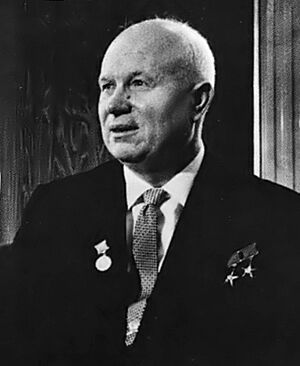
Suslov regained his influence in 1955 and was elected back into the Presidium. At the 20th Party Congress in 1956, Khrushchev gave a famous speech about Stalin's "cult of personality." This meant Stalin was praised too much and had too much power. Suslov also spoke, criticizing how Stalin's actions had harmed the party.
During the Hungarian Revolution of 1956, Suslov and Anastas Mikoyan went to Budapest to help guide Soviet troops and the new Hungarian leaders. They supported the decision to send Soviet troops into Hungary to control the situation.
In June 1957, Suslov supported Khrushchev when he faced opposition from a group of leaders. Suslov was convinced that Khrushchev would win, even if he didn't have much support at first. Later, Suslov accused Georgy Zhukov, the Minister of Defence, of trying to gain too much power. Zhukov was removed from his positions, which made sure the military stayed under party control.
Khrushchev wanted to change how farms worked by dissolving state-owned machinery stations. Suslov, who liked Stalin's economic ideas, thought this change was wrong for the party's beliefs. He focused on the practical benefits of the change, but avoided giving Khrushchev credit for it.
At the 21st Party Congress in 1959, Khrushchev said the country was moving from a socialist state to a communist one. Suslov disagreed, saying that communism develops slowly through different stages and that Khrushchev's idea had not been approved by the party.
Suslov became more and more critical of Khrushchev's policies. He didn't like Khrushchev's efforts to improve relations with the United States or Yugoslavia. At home, Suslov was against Khrushchev's plan to reduce Stalin's influence and his economic changes.
Suslov visited the United Kingdom in 1959, which was a successful trip.
Sino-Soviet Split
Relations between the Soviet Union and China were difficult. Suslov criticized China's leader, Mao Zedong, saying that Mao's growing "cult of personality" was like Stalin's. Suslov led the Soviet side in the Sino-Soviet Split, a major disagreement between the two communist powers. He said that China's ideas were too extreme and went against true communist beliefs.
In the years after the "Anti-Party Group" failed, Suslov became the leader of the group in the Central Committee that opposed Khrushchev. Khrushchev managed to stay in power by agreeing to some demands during crises, like the 1960 U-2 incident and the Cuban Missile Crisis. After the U-2 Crisis, Suslov was able to replace some of Khrushchev's supporters with people who opposed him. Khrushchev's power weakened a lot after the Cuban Missile Crisis, and Suslov's power grew.
In 1964, a plan to remove Khrushchev from office began. Suslov had been sick, so Leonid Brezhnev and Alexei Kosygin led the effort to remove Khrushchev.
Suslov in the Brezhnev Era
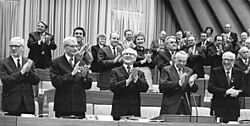
In October 1964, Khrushchev was removed from power. Suslov played a very important role in this event.
After Khrushchev was gone, Suslov became one of the most powerful Soviet politicians in the 1960s, along with Premier Alexei Kosygin and First Secretary Leonid Brezhnev. Suslov had led the opposition against Khrushchev for years, so he had a lot of power within the Central Committee when Brezhnev became leader. However, Suslov was never interested in becoming the main leader of the Soviet Union. He preferred to work behind the scenes.
A "collective leadership" was formed right after Khrushchev was removed. This group included Brezhnev as First Secretary, Kosygin as head of government, and Anastas Mikoyan (later Nikolai Podgorny) as head of state. This was an unofficial group of three leaders, sometimes called a Troika. Suslov was always against one person having all the power, like Stalin and Khrushchev did.
Suslov believed in "democratic centralism," which meant decisions were made by the party as a whole. He stopped Brezhnev from taking over Kosygin's job as head of government in 1970. Suslov was ranked fourth in the Politburo, after Brezhnev, Podgorny, and Kosygin.
During Brezhnev's time, Suslov became even more strict. He was against any anti-Soviet actions by leaders in Eastern European countries. However, he voted against sending Soviet troops into Czechoslovak Socialist Republic in 1968 during the Prague Spring. Suslov was seen as a very important figure for "Orthodox communists" in Eastern Europe. He believed that the Soviet Union should always be the main leader in the communist movement.
Suslov was given the unofficial title "Chief Ideologue of the Communist Party." This meant he was the main person in charge of the party's ideas. Suslov spent a lot of time honoring the ideas of Vladimir Lenin, Karl Marx, and Friedrich Engels. However, he also supported some changes to the strict beliefs of Marxism-Leninism. For example, the party stopped controlling all scientific ideas in biology, chemistry, and physics.
But there was still strong control over literature. This included not only books that criticized Soviet rule but also some of Lenin's own works.
Later Years and Passing
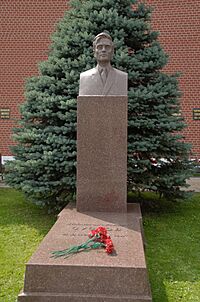
In the early 1980s, there were many political and economic problems in Poland. Suslov was very important in dealing with this "Polish crisis." He led a special group in the Politburo that decided what to do. This group included powerful figures like Yuri Andropov (KGB Chairman) and Dmitriy Ustinov (Minister of Defence).
On 28 August, the group thought about sending Soviet troops to Poland. But Wojciech Jaruzelski, the Polish leader, convinced them that sending troops would make things worse. Suslov agreed, saying that "if troops are introduced, that will mean a catastrophe." Suslov helped convince the Polish leaders to declare martial law in Poland, which meant the military took control to keep order.
In January 1982, Yuri Andropov told Suslov that Semyon Tsvigun, a high-ranking KGB official, had protected Brezhnev's children, Galina and Yuri, from investigations into wrongdoing. Suslov wanted Tsvigun to explain this. Suslov even threatened to remove Tsvigun from the Communist Party. However, Tsvigun died on 19 January 1982 before he could respond.
Two days later, Suslov had a heart attack and died on 25 January 1982. His death is seen as the start of the competition to become the next leader after Brezhnev. Andropov took over Suslov's important role as the Party's Second Secretary.
Suslov was buried on 29 January at the Kremlin Wall Necropolis in Moscow. Brezhnev was very sad about Suslov's death.
Awards and Honors
Suslov received many awards and medals during his life. These included:
- Two Hero of Socialist Labour awards (a high honor for work)
- Five Orders of Lenin (a very important Soviet award)
- One Order of the October Revolution
- One first-degree Order of the Patriotic War
The USSR Academy of Sciences also gave Suslov the Gold Medal of Karl Marx. He also received top awards from East Germany, Mongolia, and Czechoslovakia.
- Soviet Union
| Hero of Socialist Labor, twice (1962, 1972) | |
| Order of Lenin, five times (1940, 1952, 1962, 1971, 1972) | |
| Order of the October Revolution (1977) | |
| Order of the Patriotic War, 1st class (1945) | |
| Medal "To a Partisan of the Patriotic War", 1st class (1943) | |
| Medal "For the Defence of the Caucasus" (1944) | |
| Medal "For Valiant Labour in the Great Patriotic War 1941–1945" (1945) | |
| Medal "For the Victory over Germany in the Great Patriotic War 1941–1945" (1945) | |
| Badge "50 Years in the CPSU" (1981) |
- Foreign Awards
| Hero of Socialist Labor (Bulgaria) | |
| Order of Georgi Dimitrov (Bulgaria) | |
| Order of Klement Gottwald (Czechoslovakia) | |
| Order of Karl Marx (East Germany) | |
| Order of Sukhbaatar (Mongolia) | |
| Gold Star Order (Vietnam) |
Personal Life
Suslov was married to Yelizaveta Alexandrovna (1903–1972). She worked as the Director of the Moscow Institute for Stomatology (a dental school). She had serious health problems, especially diabetes, but she often did not follow her doctors' advice.
A famous American doctor, Bernard Lown, was asked to see her at the Kremlin Hospital. This was rare for a foreign doctor. Suslov was thankful for Lown's help. However, he avoided meeting Lown in person because Lown was from an "imperialistic" country.
Yelizaveta and Suslov had two children. Their son, Revoly, was born in 1929 and named after the Russian Revolution. Their daughter, Maya, was born in 1939 and named after May Day.
See also
 In Spanish: Mijaíl Súslov para niños
In Spanish: Mijaíl Súslov para niños


